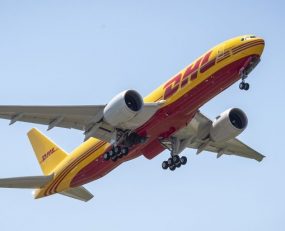
Deutsche Post-DHL’s (DP-DHL) experience in the first quarter of 2020 was painful but not disastrous and it would be wrong to ascribe all of its problems to COVID-19.
On a year-on-year basis, revenue for the quarter fell just 0.9% to €15.487bn. EBIT (Earnings Before Interest and Tax) however, crashed by 40.9% to €592m and net profit was down by 59.7% to €301m. After charges on assets, the company recorded a loss of €80m.
However, these numbers are complicated by a string of issues, from the boost to the numbers last year of the sale of the Chinese contract logistics business, to the restructuring in the Supply Chain business and the write-offs around StreetScooter. In-fact DP-DHL said that the impact of COVID-19 on the EBIT number was €210m, or half of the fall in profits. Probably the real pain of the crisis will emerge in the Q2 numbers.
Looking at the individual businesses, the picture is complex. As usual, Post & Parcel Germany was supported by the growth in parcel volumes which increased by 9.9%, whilst letter mail and other business suffered especially towards the end of the quarter. Revenue was up 3.8% and EBIT up 47.1%.
Unusually and a little surprisingly, DHL Express’ profits fell. EBIT was down year-on-year by 13.2% at €393m although revenue was up 4.5%. Demand was, of course, very volatile with China collapsing and then recovering through February and March as North America and Europe crashed towards the end of the quarter. The marketing mix also changed with the higher-margin time definite services experiencing a noticeable rise in demand. Yet despite this, profits fell.
Global Forwarding, Freight was easier to understand. Revenue fell by 4.1% and EBIT by 27% on volume falls in ocean and air freight of 10.7% and 5.7% respectively. Market distress has been acute and so it is not hard to see why profits were affected.
Supply Chain appeared to take a savage hit, with EBIT down by 78.4% at €105m. However, this fall is more to do with the impact of the sale of the Chinese business last year. DHL Supply Chain said that the underlying business saw continued growth across most of its regions although it is clear that turbulence has been acute here, with automotive and some parts of retail coming to a near halt whilst healthcare and food have been booming.
This quarter’s numbers from DP-DHL are more complex than they appear. Although the crisis has had an impact, the nature of that impact has not been uniform and it is surprising that a business such as DHL Express has suffered in the way it has bearing in mind its market position. DP-DHL is not overly distressed financially but it will be interesting to see how it responds in the second quarter as market conditions evolve.
Source: Transport Intelligence, 12 May 2020
Author: Thomas Cullen